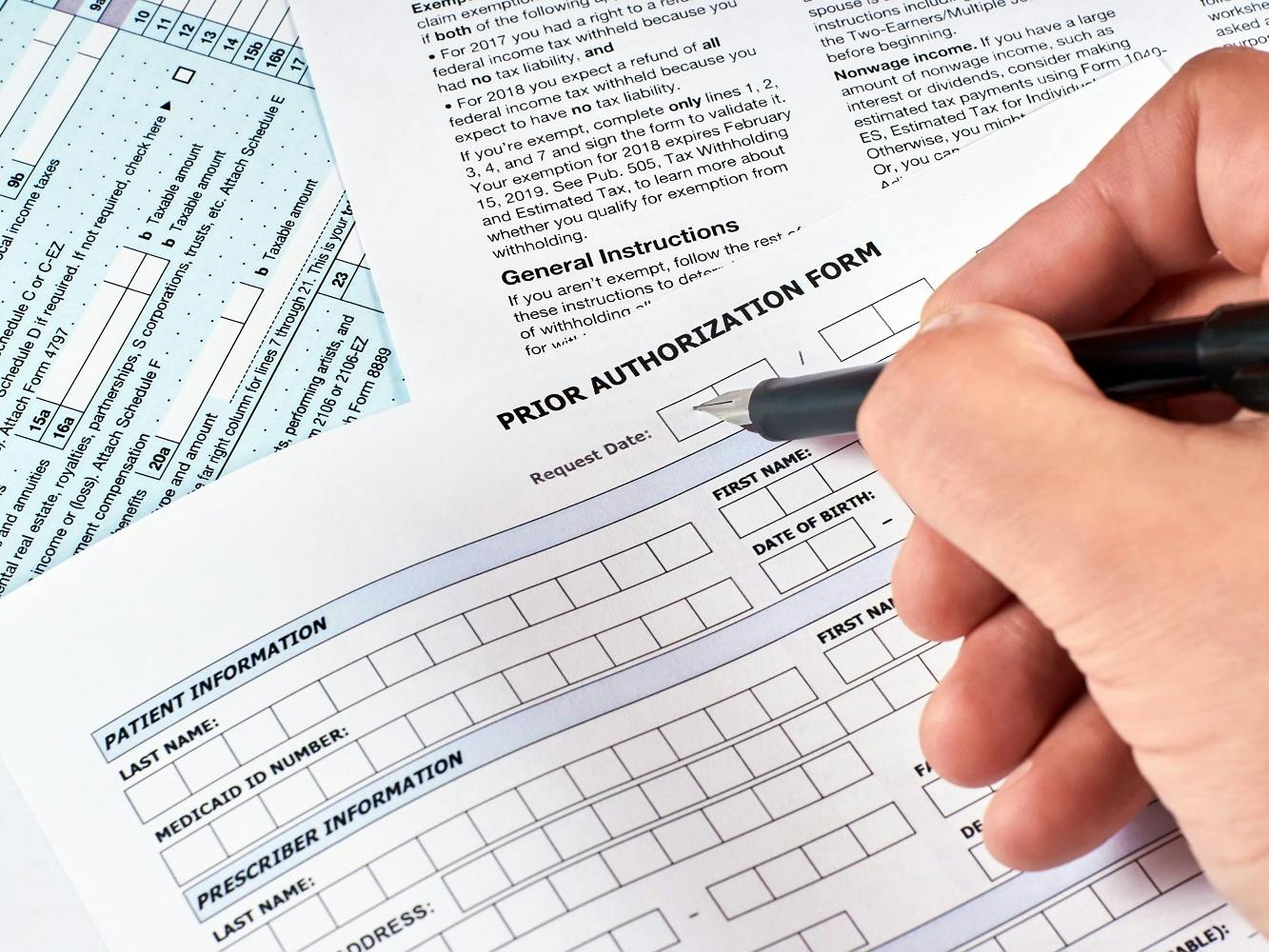
Some prescription medications, procedures, and medical equipment require prior authorization before your Medicare plan will cover them.
Prior authorization is a requirement that a health care provider obtain approval to provide a certain service. When something requires prior authorization, Medicare benefits are only paid if the medical care, service, or supply has been pre-approved.
This typically applies to Medicare Advantage and Part D plans, but it also can sometimes apply to Original Medicare coverage and services.
The purpose of prior authorization is to deter beneficiaries from getting care that is not truly medically necessary, which can help reduce costs for both patients and insurers. However, these requirements can also be a hassle for beneficiaries seeking care and can in turn limit access to care that may be necessary.
It’s important for Medicare beneficiaries to understand prior authorization rules to avoid situations where a service, prescription drug, or type of equipment is not covered. Read on to learn more.
Medicare prior authorization requirements
In the past, Original Medicare rarely required prior authorization for services. In fact, the Social Security Act originally did not authorize any form of prior authorization. Since then, the law has changed slightly to allow for prior authorization for:
- Certain durable medical equipment (DME)
- Some provider services, particularly those related to home health care
- Some drugs covered by Part B in an outpatient setting
- Specific cosmetic procedures
However, this is rare, and in most cases, Medicare beneficiaries do not need prior authorization to:
- Get inpatient hospital care
- Get outpatient hospital care
- Get care out of state
- See a specialist
Over the past few years, Centers for Medicare & Medicaid Services (CMS) has attempted to actually expand the use of prior authorization to help reduce fraud, inappropriate service use, and related costs. This can help prevent providers from giving unnecessary care, protect beneficiaries from receiving unnecessary care or supplies, and keep overall costs down.
Unfortunately, some believe this could lead to delays or denials of care for Medicare beneficiaries who need certain services or supplies, which could lead to a more frustrating health care experience. And, if a beneficiary requests prior authorization for a service and is denied, it will likely not be covered.
However, enrollees can appeal this decision with the help of their provider.
Do Part D plans require prior authorization?
While different plans have different rules, most Part D prescription drug plans require prior authorization for coverage on specific drugs. Check with your plan to learn more.
Often, your plan provides request forms online that you can download and take to your doctor for help completing them correctly.
Part D plans can also use prior authorization in conjunction with step therapy for certain drugs, which means enrollees usually must try a less expensive drug prior to getting coverage for a more expensive one. For example, you may be required to try a generic drug, then a less expensive brand-name drug before you can get a more expensive brand-name drug covered. However, this depends on your medical condition and what your provider believes to be medically necessary.
Do Medicare Advantage plans require prior authorization?
Medicare Advantage (Part C) plans are sold by private insurance companies and are required to offer the same coverage as Medicare Part A and Part B. Additionally, they typically have extra benefits for things like:
- Prescription drug coverage
- Vision
- Hearing
- Dental
- Fitness memberships
Because they are sold by private companies, many Part C plans require prior authorization to:
- See certain specialists
- Get out-of-network care
- Get non-emergency hospital care
- Stay at a skilled nursing facility
- Acquire certain DME
There are also other situations depending on the plan. This is especially true for high-cost services used by enrollees, typically with significant medical needs, including inpatient care or certain drugs.
Medicare Advantage plans that have prescription drug coverage may also use prior authorization for step therapy for certain drugs, similar to Part D plans.
Each plan’s requirements and restrictions are different, so it’s important to review your Evidence of Coverage and ask your plan prior to receiving any services or supplies.
What is the prior authorization process for Medicare?
Refer to your specific plan to learn if a service, equipment, or type of care requires approval. Your provider will then work to request the appropriate permissions from Medicare or your plan. They may need to provide information like why you need the service, outline medical necessity, and other details. Your provider should be familiar with documentation requirements, but you can always double check with your plan if you’re unsure.
Once approved, your plan will pay for the service. However, note that approval can take several days or weeks, so it’s important to start this process as soon as possible when necessary.
What happens if I don’t get prior authorization?
If your prior authorization request is denied, you and your doctor can appeal the decision. They may have to request an exception and support the request with a statement or additional documentation explaining why you need the service requested. If it is denied again, you will not have coverage for the service and will likely have to pay 100% of the cost out-of-pocket.
Similarly, if you receive a service or care that required prior authorization and you did not request it ahead of time, that service will likely not be covered and you will have to pay the full cost. Typically, because your provider is responsible for initiating prior authorization, this won’t happen. But it’s important to be aware of what may need prior authorization prior to getting any care or services just in case.
Additional resources
Find a Medicare Plan
Internal Website Link
Medicare.gov: Drug Plan Coverage Rules
External Website Link



